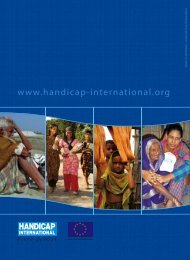Full page photo print - Harvard Law School Project on Disability
Full page photo print - Harvard Law School Project on Disability
Full page photo print - Harvard Law School Project on Disability
Create successful ePaper yourself
Turn your PDF publications into a flip-book with our unique Google optimized e-Paper software.
(l) Recognizing the importance of internati<strong>on</strong>al cooperati<strong>on</strong> for improving the living c<strong>on</strong>diti<strong>on</strong>s<br />
of pers<strong>on</strong>s with disabilities in every country, particularly in developing countries,<br />
(m) Recognizing the valued existing and potential c<strong>on</strong>tributi<strong>on</strong>s made by pers<strong>on</strong>s with<br />
disabilities to the overall well-being and diversity of their communities, and that the promoti<strong>on</strong><br />
of the full enjoyment by pers<strong>on</strong>s with disabilities of their human rights and fundamental<br />
freedoms and of full participati<strong>on</strong> by pers<strong>on</strong>s with disabilities will result in their enhanced sense<br />
of bel<strong>on</strong>ging and in significant advances in the human, social and ec<strong>on</strong>omic development of<br />
society and the eradicati<strong>on</strong> of poverty,<br />
(n) Recognizing the importance for pers<strong>on</strong>s with disabilities of their individual aut<strong>on</strong>omy and<br />
independence, including the freedom to make their own choices,<br />
(o) C<strong>on</strong>sidering that pers<strong>on</strong>s with disabilities should have the opportunity to be actively<br />
involved in decisi<strong>on</strong>-making processes about policies and programmes, including those directly<br />
c<strong>on</strong>cerning them,<br />
(p) C<strong>on</strong>cerned about the difficult c<strong>on</strong>diti<strong>on</strong>s faced by pers<strong>on</strong>s with disabilities who are subject<br />
to multiple or aggravated forms of discriminati<strong>on</strong> <strong>on</strong> the basis of race, colour, sex, language,<br />
religi<strong>on</strong>, political or other opini<strong>on</strong>, nati<strong>on</strong>al, ethnic, indigenous or social origin, property, birth,<br />
age or other status,<br />
(q) Recognizing that women and girls with disabilities are often at greater risk, both within and<br />
outside the home of violence, injury or abuse, neglect or negligent treatment, maltreatment or<br />
exploitati<strong>on</strong>,<br />
(r) Recognizing that children with disabilities should have full enjoyment of all human rights and<br />
fundamental freedoms <strong>on</strong> an equal basis with other children, and recalling obligati<strong>on</strong>s to that<br />
end undertaken by States Parties to the C<strong>on</strong>venti<strong>on</strong> <strong>on</strong> the Rights of the Child,<br />
(s) Emphasizing the need to incorporate a gender perspective in all efforts to promote the full<br />
enjoyment of human rights and fundamental freedoms by pers<strong>on</strong>s with disabilities,<br />
(t) Highlighting the fact that the majority of pers<strong>on</strong>s with disabilities live in c<strong>on</strong>diti<strong>on</strong>s of poverty,<br />
and in this regard recognizing the critical need to address the negative impact of poverty <strong>on</strong><br />
pers<strong>on</strong>s with disabilities,<br />
(u) Bearing in mind that c<strong>on</strong>diti<strong>on</strong>s of peace and security based <strong>on</strong> full respect for the purposes<br />
and principles c<strong>on</strong>tained in the Charter of the United Nati<strong>on</strong>s and observance of applicable<br />
human rights instruments are indispensable for the full protecti<strong>on</strong> of pers<strong>on</strong>s with disabilities, in<br />
particular during armed c<strong>on</strong>flicts and foreign occupati<strong>on</strong>,<br />
(v) Recognizing the importance of accessibility to the physical, social, ec<strong>on</strong>omic and cultural<br />
envir<strong>on</strong>ment, to health and educati<strong>on</strong> and to informati<strong>on</strong> and communicati<strong>on</strong>, in enabling<br />
pers<strong>on</strong>s with disabilities to fully enjoy all human rights and fundamental freedoms,<br />
(w) Realizing that the individual, having duties to other individuals and to the community to<br />
which he or she bel<strong>on</strong>gs, is under a resp<strong>on</strong>sibility to strive for the promoti<strong>on</strong> and observance of<br />
the rights recognized in the Internati<strong>on</strong>al Bill of Human Rights,<br />
(x) C<strong>on</strong>vinced that the family is the natural and fundamental group unit of society and is<br />
entitled to protecti<strong>on</strong> by society and the State, and that pers<strong>on</strong>s with disabilities and their<br />
family members should receive the necessary protecti<strong>on</strong> and assistance to enable families to<br />
c<strong>on</strong>tribute towards the full and equal enjoyment of the rights of pers<strong>on</strong>s with disabilities,<br />
254 HumAn RIGHts. yes! ActI<strong>on</strong> AnD ADvocAcy <strong>on</strong> tHe RIGHts oF peRs<strong>on</strong>s wItH DIsAbIlItIes




